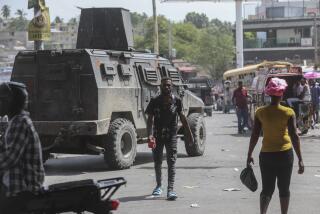Liberian Rebels Still Terrorizing, U.N. Finds
- Share via
TAPPETA, Liberia — The first U.N. peace missions to Liberia’s rebel-held east have found villages deserted except for looting insurgents, and terrorized civilians in the grip of rebels or lying dead in the bush.
An Associated Press reporter accompanying Gen. Daniel Opande, the Kenyan commander of Liberia’s 3-month-old U.N. peace force, saw hamlet after hamlet bloodied by pillaging fighters or persistent clashes between rebels and government hard-liners.
“There is no war, no more ground for you to gain,” Opande told rebels in the eastern town of Griae -- attacked, sacked and burned by the insurgents three months after their leader signed the West African nation’s peace deal.
The continuing devastation in territory under control of the smaller of Liberia’s two rebel movements underscores the difficulty a fledgling U.N. peace mission faces in ending 14 years of bloodletting in Liberia.
Due to grow to about 15,000 strong, the United Nations force has seen only about 4,500 armed troops deploy -- mostly West Africans, with Bangladeshis the next largest contingent. Peacekeepers have been concentrated in Monrovia, the capital. It has been calm there since August, when West African troops landed and President Charles Taylor fled into exile.
Opande’s trip to the east was a small fact-finding mission; nationwide deployment can come only when the U.N. force gains strength.
An Aug. 18 power-sharing deal brought rebels from Liberians United for Reconciliation and Democracy and the smaller, eastern-based Movement for Democracy in Liberia, or MODEL, into a transition government with Taylor’s followers.
But Opande’s word on the ground that MODEL rebel leader Thomas Nimely Yaya was now allied with the government seemed to have little effect on the child fighters strutting with machine guns.
Arriving in Griae, Opande’s mission found rebels holding six townspeople. The insurgents had just dragged the men and women out of hiding.
“The war is our problem. When the war comes, we run into the bush,” said 65-year-old Dennis Siaway.
East of Griae, in the village of Sarley, the bodies of 12 women and children lay in the streets, U.N. troops sent ahead of Friday’s mission told Opande.
In Tappeta, Opande said: “This place is completely destroyed. It makes me, as an African, feel very sad. Because instead of building, we are destroying, and we continue to destroy, and destroy and destroy.”
More to Read
Sign up for Essential California
The most important California stories and recommendations in your inbox every morning.
You may occasionally receive promotional content from the Los Angeles Times.













